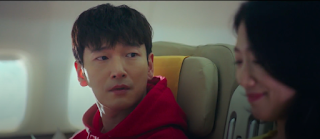This post contains spoilers for Episodes 7 and 8. So read at your own risk.
When Siri first captured our imagination one of the silly things we did for laughs was ask her where the bodies were buried. At that time she efficiently listed all the nearest cemeteries in our area, taking our request rather literally.
Perhaps I have a turn for the morbid but cemeteries are fascinating places for me. Not just because they contain outpourings of grief and deep affection for lost ones but they are reminders that none of us exist in a vacuum... that we're all part of something bigger like family or community and history. We all belong somewhere for better or for worse. When someone passes from our midst, sending them off is crucial not just for our mental health but so that we can move on and live the rest of our lives responsibly and without regrets. Although losing a loved one due to illness is not foreign to me, I can't even begin to imagine what it's like for those who are left behind when murder is involved. Moreso when bodies are never found. That missing piece of the puzzle becomes an open wound and the ones carrying them are constantly second guessing themselves wondering evermore if there was something they could have done to prevent it, taking more responsibility for what happened than they logically need to.

Whatever we think of the perpetrator and his motives for disposing of the women in the way that he did, this show refuses to make this about him. Feel free to throw invectives at him although there's a part of me that sees him as a rather tragic figure. He was impotent as far as women were concerned and was despised by even those closest to him. Once he had a taste of killing, it became his default way of lashing out at a world that reminded him of and jeered at his impotence. His impotence was reinforced by the way he buried the bodies and cut off the women's fingers. As long as they remained buried, it would be his game to enjoy in private satisfaction while suspicion was cast on others for the role of murderer. Yes, he was in crude terms, a coward. As long as he revelled in his extracurricular activities his community and his town could never move on, redevelop. His crimes were destined to haunt them, create a fog of suspicion until the bodies were finally found. When a small close knit community is gripped by crime, murder especially something malevolent transpires. It isn't just that a dark cloud hovers over the landscape but all kinds of emotions come to the surface.

Nobody who commits a crime is eager to be caught but when they're not caught, they're more likely to be emboldened. It's often the case but not always. The families of victims, on the other hand, often seem caught in a state of emotional paralysis. Doubt, suspicion and outrage prevail. When justice is not served it destroys lives, relationships and ultimately it has lasting impact on the social fabric. That's what every K crime show is fond of pointing out. And rightly so.


Episode 7 opens with a flashback that sees Dong-sik conversing with his former partner (his burden as he calls him) during his stint as a highly regarded detective at the Regional Investigation Unit. The two men are on a stakeout of a killer that got away. His partner confesses that he has a conflict of interest because one of the victims was a friend and he adamantly refuses to be taken off the case. As the audience anticipates, this scenario can only lead to an unmitigated disaster. And so it does. The younger man claims outrage that a murderer has gone scot free because the evidence isn't strong enough so he will do "whatever it takes" to get the bad guy. So what in the world does "whatever it takes" entail? That's the six million dollar question. Reckless pursuit of a suspect that leads to death and cover-up? Tampering of evidence? A lifelong burden for a competent cop who has a bad case of survivor's guilt? This entire incident begs many questions. Is capturing a perpetrator so important that the safety and integrity of others have to be compromised? What's the line that can't or shouldn't be crossed? On and on it goes. I imagine that's why there are procedures and processes in place because people being what they are, cross the line far too readily. No one is above the law no matter how good the cause happens to be. Zeal, no matter the cause, is no substitute for intelligence.

This was Ju-won's problem initially. He had a "whatever it takes" policy as well that saw him bulldozing into people's lives and situations that he hadn't the faintest clue about and has no interest in probing further. Until it gradually dawns on him that to solve these crimes, he has to do the grunt work of getting to know the people involved. Mixing it with the locals was always a tough ask for the mysophobic cop. Moreover Dong-sik stopped toying with Ju-won the instant he sensed some sincerity in the younger man. When Ju-won dropped his bravado, Dong-sik ended his game. Dong-sik had met a Ju-won before and that didn't end well for anybody concerned.


Although in recent days Dong-sik has proven that he's not the ruthless serial killer he's been accused of, he is a man of many secrets. He's certainly not above fiddling with evidence or removing case files from the archives or acting on impulse. It's similar to Chief Nam. No one can accuse either of them of being "by-the book". Good or bad, being a cop doesn't necessarily mean that men and women with all their emotions on display act on the basis of regulation or logic. Unfortunately it would seem that some of their more "irrational" actions have stymied the investigation. At least from Ju-won's perspective. Why are these men so deliberately recalcitrant and obstructionist. For example, why didn't Dong-sik confront the perpetrator with the evidence of the finger-tips? Guilt? Friendship? Utter disbelief? Was he hoping that the killer would confess off his own bat? And then there's the issue of where the rest of the body is. No body, no indictment. The show then takes us through Dong-sik's thought process. It's not enough to gain justice for Min-jung. There are all the other women who died in the culprit's hands buried in an unmarked grave somewhere. The realisation hits home that redressing this wrong is a communal issue even though one man committed this heinous crime to individual women.

Spotlight is cast on Jae-yi who has aged beyond her years living for much of her adult years with the tragedy of not knowing where her mother has gone. Is she alive? Is she dead? Through common circumstance, she can be Dong-sik's soul mate although not in a romantic sense I don't think. She's been sneered at and gossiped about. Blame for Mum's disappearance has been dumped at her doorstep. Salacious rumours related to her mother were rife especially in those early days. She shows up every time a body turns up. She's been on her own ever since. Hence it isn't surprising that she has a clarity about Dong-sik's state of mind that no one else has. In her butcher shop where she's made a living and serve up meat to regular gatherings of cops, she carries bruises from where life has hit her hard. She gets Dong-sik.

Because of all that, there's something admirable in her recklessness. She's had enough of Dong-sik being the only one carrying the can for the entire village. It's a burden too much for one man to bear. Although why that man chooses to take it all on himself seems incomprehensible to the onlooker. Fortunately for her, Dong-sik catches on to the perpetrator's trick. At the end of Episode 8, there's overwhelming evidence to say that the body buried at the back of her shop, is her missing mother's. The show doesn't tell us how they know but those in the know must surmise that old habits die hard.


There's a strange paradox (if that's the right word for it) in that gesture. On one level it seems perverse -- needlessly torturing a young woman when you know she's been pining over her mother and bearing the brunt of village gossip -- when her mother has been so close the entire time. On the other hand, it feels like a warped sense of appeasement trying make up to someone else for their loss and lacking any kind of courage to go all the way. We aren't given complete insight into the inner workings of the culprit's mind so speculation is all we have at this point. He hid his crime so close to home and even in plain sight (some might say). Is it just cunning or there's something more?
Whatever his intentions, the way in which he concealed two women's bodies seems to be symbolic of an inability to let go that pervades the narrative. In his case, there's no remorse for what he's done but continuing resentment for the victims. He feels entitled despite the betrayal the people around him feel, particularly those who consider him a friend.
Right to the bitter end he vehemently maintains too that he's not responsible for Dong-sik's sister's disappearance. The fact that a body hasn't turned up in the backyard of the Lee family home adds weight to that. I have little doubt that there's another ugly secret that has haunted Manyang that's also in dire need of being exhumed. The odour of death has wafted through the town's air and contaminated drinking water long enough. The missing need to be declared dead. The ones waiting need to move on and live again.
So Manyang is a place where bodies and secrets are buried. The arrival of Han Ju-won heralds the unearthing of them, one by one. Where did it all begin? With whom did it begin? I suspect that the man who buried Min-jung alive is just the tip of the iceberg.
















































